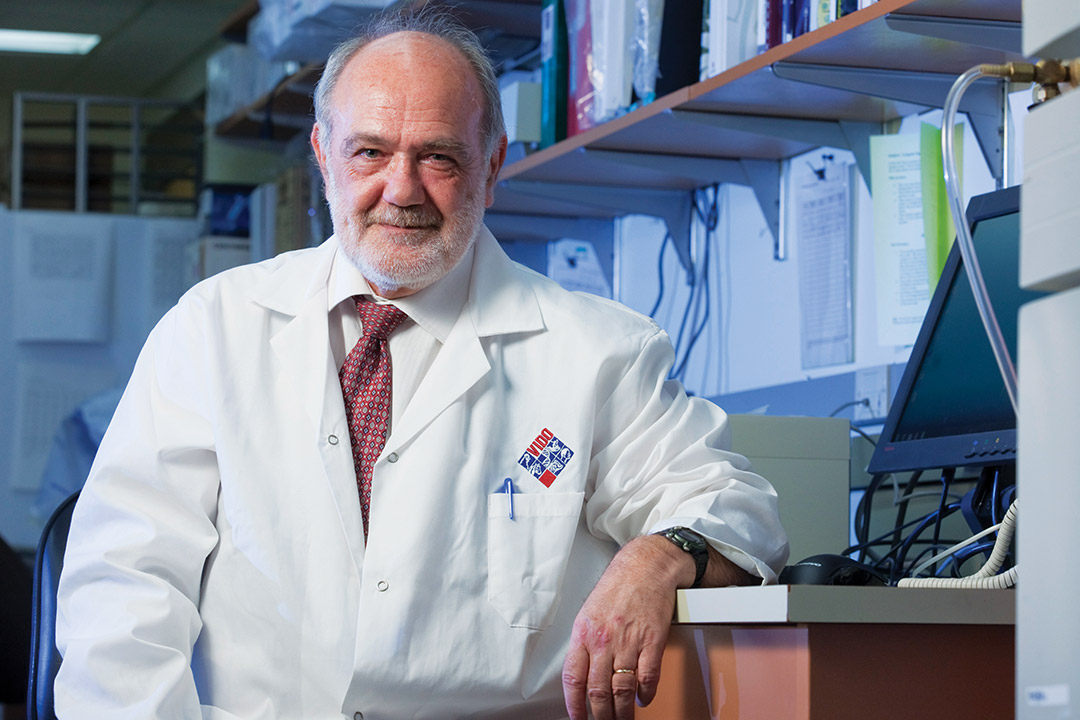
Leading health researchers honoured
World-renowned vaccine researcher Andrew Potter was among those recognized by the Saskatchewan Health Research Foundation (SHRF) for their outstanding contributions to creating a culture of innovation and health research in the province.
By Sarath PeirisPotter, the director and CEO of the Vaccine and Infectious Diseases Organization—International Vaccine Centre (VIDO-InterVac), received SHRF’s Achievement Award for overall career achievements and leadership during 33 years of health research in Saskatchewan. He was chosen by a panel of local and national experts from a range of fields.
Potter is recognized worldwide for research on how bacteria cause disease and his “one health” focus at the interface of human and animal health. His innovative research projects have led to several unique achievements, including the world’s first genetically engineered animal vaccine and vaccines to protect against food- and water-borne pathogens.
“It is an honour and a pleasure to receive the foundation’s Achievement Award,” said Potter. “The credit goes to the people I have worked with over the years. I am proud of the scientific advancements we have been able to accomplish through teamwork.”
Potter, also a professor in the department of veterinary microbiology at the Western College of Veterinary Medicine at the U of S, is working to apply genomics to animal health, forging links between researchers in human and animal infectious diseases to leverage the greatest benefit from technologies common to both fields.
Potter has mentored more than 40 graduate students and postdoctoral fellows, and has contributed to more than 60 patents for animal and human vaccines and therapeutics.
Dr. Cory Neudorf, faculty member in the College of Medicine’s Department of Community Health and Epidemiology and a community health researcher, was also honoured with SHRF’s Impact Award for community health leadership that has provided health and social impacts in Saskatchewan.
He and his team led a study into health inequities within Saskatchewan and among regional health authorities regarding health behaviours, services and outcomes. The study will help define geographic areas in Saskatchewan with health inequities and determine health inequity trends over time for selected indicators. The results of his research will provide a better understanding of priorities in health care, and identify local, regional and national interventions that could help mitigate health inequalities in the future.
Five U of S health scientists were named top-ranking researchers in SHRF competitions and recognized with SHRF Excellence Awards:
- Dr. Uladzimir Karniychuk: The VIDO-InterVac researcher established a fetal pig model for the Zika virus (ZIKV) infection that reproduces early infection in human fetuses.
Karniychuk’s team has also created a model that reproduces the range of ZIKV-related pathology in newborns infected in the womb. The researchers will use these models to understand ZIKV biology, and help shape global and national surveillance and strategies to diagnose and prevent Zika.
- Lloyd Balbuena: A member of the College of Medicine psychiatry faculty, Balbuena is evaluating lifestyle and pharmacological interventions in treating neuroticism and mood instability for suicide prevention.
His team is examining lifestyle variables for preventing mood episodes, use of mood stabilizers in depression, and how differences in daily activities relate to mood. The study involves using large health databases from Norway and Britain at the macro level, and working with a small group of Saskatchewan patients to contribute evidence for suicide prevention.
- Ayelen Blanco Imperiali: The marine biologist from Spain is at WCVM as part of a postdoctoral fellowship. She is using zebrafish to learn how two newly identified hormones, which regulate metabolism, affect growth.
The research involves studying the effect of the hormones on the brain, pituitary, muscles and liver, tissues that are important in regulating growth. The study includes normal zebrafish, obese zebrafish, and fish that genetically lack the hormones. Diseases affecting metabolim—such as obesity—are related to growth defects in humans. Her research will provide new knowledge about these hormones and the impact they have on health and disease.
- Jim Xiang: Xiang, professor in oncology and pathology, and senior research scientist at the Saskatchewan Cancer Agency, leads a team researching ways to stimulate the body’s immune response to optimize the impact of a new tumour-destroying technology known as the NanoKnife.
Saskatoon and Toronto are the only centres in Canada with a clinical NanoKnife program. Studies have shown that the use of the new technology has improved the overall outcomes for pancreatic cancer for the first time in 40 years. Xiang’s team is researching ways to boost the immune system response and target cancer cells that survive the NanoKnife treatment.
- Nancy Gyurcsik: A kinesiology professor who specializes in exercise psychology, Gyurcsik is developing a program to train exercise providers (instructors and personal trainers) on counselling people with chronic-non-cancer pain about the benefits of exercising while in pain.
While medications are the usual treatment for pain, they are largely ineffective, Gyurcsik reports, while exercise helps with pain management. Her team identified exercise providers who are best suited to counsel patients about exercising with pain. The goal is to develop, test and refine workshops for exercise providers that give them confidence in counselling and allay their fears about harm to participants who attempt exercise.

